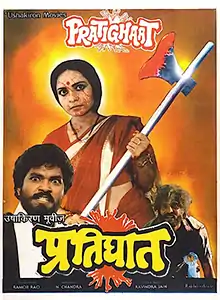Pratighaat (1987 film)
Pratighaat (transl. The Revenge) is a 1987 Hindi feminist drama film directed by N. Chandra, starring Sujata Mehta in the lead.[1] It is a remake of the Telugu film Pratighatana (1985), directed by T. Krishna, with Vijayshanti in the lead.[2]
| Pratighaat | |
|---|---|
 Poster | |
| Directed by | N. Chandra |
| Screenplay by | T. Krishna N. Chandra Jalees (dialogue) |
| Story by | T. Krishna |
| Based on | Pratighatana by T. Krishna |
| Produced by | Ramoji Rao |
| Starring |
|
| Cinematography | H. Laxminarayan |
| Edited by | N. Chandra |
| Music by | Ravindra Jain |
Production company | |
Release date |
|
Running time | 164 minutes |
| Country | India |
| Language | Hindi |
Made on a low budget, and with no big stars, it went on to become a hit, making Rs. 8 crore at the box office.[3] It became part of the hat-trick of hit films by N. Chandra, Ankush (1986), Pratighaat and Tezaab (1988).[2]
Plot
The film deals with politics-criminal nexus and a college lecturer who takes them on, even after she faces public disrobing. She finally takes the law into her own hands to avenge her insult.[4][5]
Cast
- Sujata Mehta as Laxmi S. Joshi
- Arvind Kumar as Advocate Satyaprakash Joshi
- Charan Raj as Kali Prasad
- Rohini Hattangadi as Durga
- Gyan Shivpuri as Durga's Husband
- Mohan Bhandari as Police Inspector Ajay Srivastav
- Ashok Saraf as Lawyer, assistant to Kali
- Nana Patekar as Ex-Constable Karamveer
- Subbiraj as Laxmi's father
- Usha Nadkarni as Laxmi's mother-in-Law
- Kota Srinivasa Rao
- Ravi Patwardhan
Music
Lyrics: Ravindra Jain
- "Tere Sar Pe Mere" – S. Janaki, S. P. Balasubrahmanyam
- "Hamre Balma Beimaan" – S.P. Balasubrahmanyam
- "Likhungi Mahabharat Naya" – S. Janaki
- "Sara Nagar Aap Hi Ke Saath Hai" – Sushil Kumar, Mohammed Aziz
References
- M.L. Dhawan (21 July 2002). "On the sands of time — 1987: Year of the invisible hero". The Sunday Tribune. Retrieved 24 September 2014.
- Madhu Jain (28 February 1989). "Mean street Moghul: Hit director N. Chandra brings realism to films". India Today. Retrieved 24 September 2014.
- "In Indian politics, line between politicians and goondas is fast disappearing: N. Chandra". India Today. 15 September 1987. Retrieved 24 September 2014.
- "Politician-goonda emerge as the new villain". India Today. 15 September 1987. Retrieved 24 September 2014.
- Virdi, Jyotika (2003). The Cinematic ImagiNation: Indian Popular Films as Social History. Rutgers University Press. p. 55. ISBN 978-0-8135-3191-5.
This article is issued from Wikipedia. The text is licensed under Creative Commons - Attribution - Sharealike. Additional terms may apply for the media files.